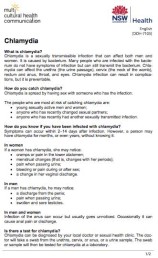Chlamydia
Key points about chlamydia
- Chlamydia is the most commonly diagnosed sexually transmitted infection (STI) in Aotearoa New Zealand. It affects people of any gender.
- Chlamydia can be easily detected with STI screening, and is easily treated with antibiotics.
- If chlamydia is not treated, serious and permanent damage can occur.
- Most people who have chlamydia (up to 75%) don't have any symptoms. But even without symptoms it can still spread to other people, so regular health check-ups are important.

Most cases of chlamydia occur through sexual contact with someone who has a chlamydia infection.
- You can get chlamydia by having unprotected vaginal, anal or oral sex with someone who has chlamydia.
- You can still get chlamydia even if the person you're having sex with doesn't ejaculate (cum).
- Chlamydia can also be spread through other types of sexual contact such as mutual masturbation, fingering or the use of sex toys.
- One simple way to protect yourself is by using a condom when engaging in sexual intercourse.
Another way of transmitting chlamydia is from mother to baby during birth. If this occurs, your baby may develop an eye or lung infection. This needs urgent treatment.
|
If you are sexually active, get regular STI checks. If you think you may have been exposed to chlamydia, see your healthcare provider for an extra STI check. |
Most people who are infected by chlamydia don't notice any symptoms and so don't know they have it.
- If you do have symptoms, they may not appear until a few weeks after you have sex with an infected person.
- Symptoms can appear 1–3 weeks after infection, many months later or not until the infection has spread to other parts of your body.
- Chlamydia can be transmitted to other people even if you don't have symptoms.
- If you have the infection but no symptoms, you can remain infectious for months or even years without knowing it.
Common symptoms, if they do occur, may include the following:
- unusual vaginal discharge (fluid)
- unusual vaginal bleeding (especially after sex)
- lower abdominal pain (including pain during sexual intercourse)
- discomfort when passing urine (peeing)
- soreness or redness at the opening of your penis
- clear or whitish discharge from your penis
- testicular (ball) pain or swelling
- rectal (bottom) discharge or discomfort.
Chlamydial infection of your throat can occur, but is less common and usually doesn't cause any symptoms.
The best way to find out if you have chlamydia is to have a sexual health check-up.
- A urine (pee) sample is used to test for chlamydia if you have a penis.
- For women, a vaginal swab is used to test for chlamydia (this can be self-collected).
- An examination may also be recommended if you're experiencing any symptoms.
- If rectal infection is suspected, a swab is taken from just inside your anus (bottom).
- A throat swab may also be recommended.
Chlamydia is easily treated with antibiotics:
- Doxycycline is recommended if you're having any symptoms. It's taken twice per day over 7 days.
- Azithromycin is an alternative and is a single-dose treatment. This is only recommended if you don't have any symptoms. It's also used to treat chlamydia in pregnancy or when breast feeding.
It's important to finish all the antibiotics, otherwise the infection may not be properly treated.
Condom use during the treatment period
- Avoid having sex without a condom during treatment because the infection can still be transmitted. Use condoms for 7 days after the start of treatment and until 7 days after all current sexual contacts have been treated.
- If you're on a combined oral contraceptive pill, use a condom for 14 days when having sex, as antibiotics can affect the reliability of the contraceptive pill.
After completing the treatment, phone your healthcare provider or return to the clinic for a follow-up after 3 months to check you have not been re-infected.
Do sexual contacts need treatment?
If you have had any sexual contact without a condom with your sexual contact/s it's very likely they are infected with chlamydia as well. Any sexual contacts you've had in the last 3 months (regardless of condom use), need to be notified. This means they need to have a sexual health check-up and it is usually recommended they are treated for chlamydia regardless of their symptoms or test results.
When treated early, chlamydia doesn't cause any long-term complications. However, if it's left untreated, serious and permanent damage can occur.
It may lead to pelvic inflammatory disease (PID). This is when female reproductive organs, found in your pelvis, become inflamed. PID may lead to ectopic pregnancies (where the pregnancy grows in your fallopian tubes instead of your uterus), infertility (when the fallopian tubes become scarred, preventing eggs getting from your ovaries to your uterus) or chronic pelvic pain.
If not treated, chlamydia can spread to testicles, leading to pain and swelling. Chlamydia may occasionally cause chronic pain and infertility in men.
Sometimes chlamydia may trigger a condition called Reiter's disease (sexually acquired reactive arthritis) which causes inflammation of your eyes, skin and joints.
Chlamydia can be passed from mother to baby during birth. The baby may subsequently develop eye infections and/or pneumonia.
For most people, another test after treatment isn’t needed. However, if you’re pregnant or have rectal chlamydia it’s recommended that you’re tested again 4 weeks afterwards, to make sure you no longer have chlamydia.
Everyone should have another test after 3 months as re-infection is common.
Regular sexual health checks (every 3 months) are a good idea if you have any unprotected sexual contact, or have sexual contact with more than 1 person.
Anyone who is sexually active can catch chlamydia. You're most at risk if you have a new sexual partner or don't use a barrier method of contraception, such as a condom, when having sex. You can help to prevent the spread of chlamydia by:
- using a condom every time you have vaginal or anal sex
- using a condom to cover the penis during oral sex
- using a dam (a piece of thin, soft plastic or latex) to cover the female genitals during oral sex or when rubbing female genitals together
- not sharing sex toys. If you do share sex toys, wash them or cover them with a new condom between each person who uses them.
The following links provide further information on chlamydia. Be aware that websites from other countries may contain information that differs from New Zealand recommendations.
Chlamydia(external link) Sexual Health Society, NZ
Chlamydia(external link) Health New Zealand | Te Whatu Ora
Chlamydia(external link) Sexual Wellbeing Aotearoa
Chlamydia(external link) NHS, UK
Chlamydia(external link) Healthy Sex, NZ
Resources
Chlamydia factsheet(external link) NSW Multicultural Health Communication Service, Australia English(external link), Arabic(external link), Chinese (traditional)(external link), Farsi(external link), Khmer(external link), Korean(external link), Thai(external link), Vietnamese(external link), more languages(external link)
References
- Treatment of sexually transmitted and other genital infections(external link) BPAC, NZ
- Genitourinary chlamydia(external link) DermNet NZ
- Chlamydia(external link) STI Management Guidelines, NZ
Clinical guidelines
Emerging issues in the management of chlamydia and gonorrhoea(external link) BPAC, NZ, 2019
Sexually transmitted infections overview(external link) Sexual Health Society, NZ
Brochures

Chlamydia factsheet(external link)
NSW Multicultural Health Communication Service, Australia
English(external link), Arabic(external link), Chinese (traditional)(external link), Farsi(external link), Khmer(external link), Korean(external link), Thai(external link), Vietnamese(external link), more languages(external link)
Credits: Healthify editorial team. Healthify is brought to you by Health Navigator Charitable Trust.
Reviewed by: Dr Phoebe Hunt, Medical Officer, Northland
Last reviewed:
Page last updated:





